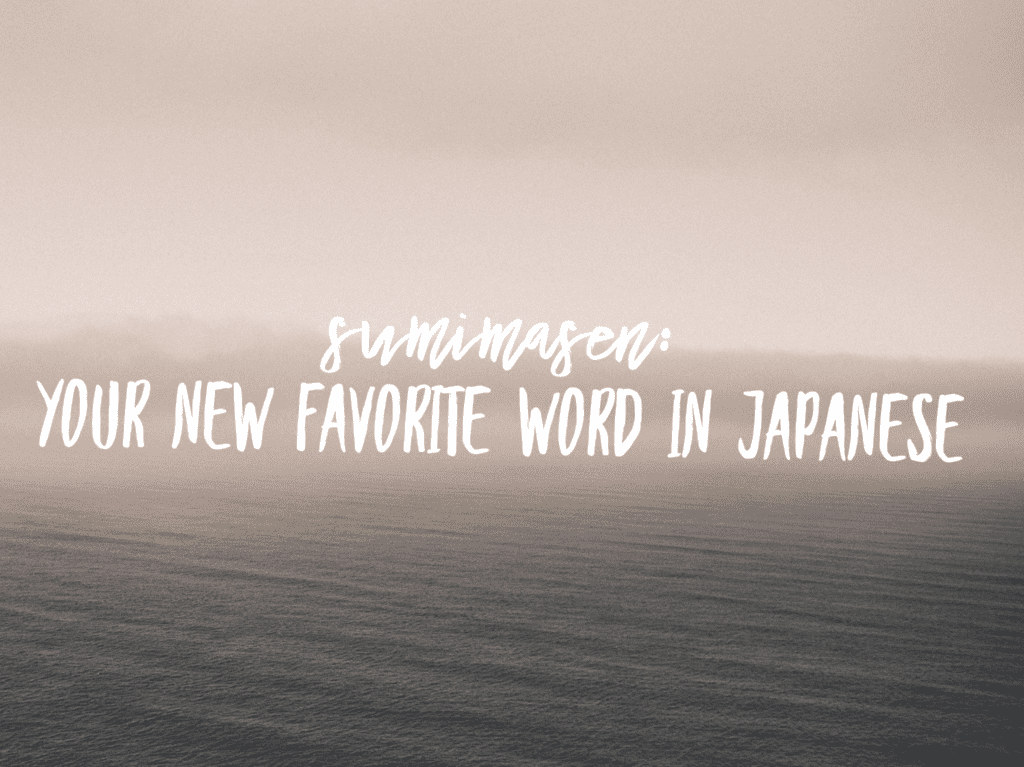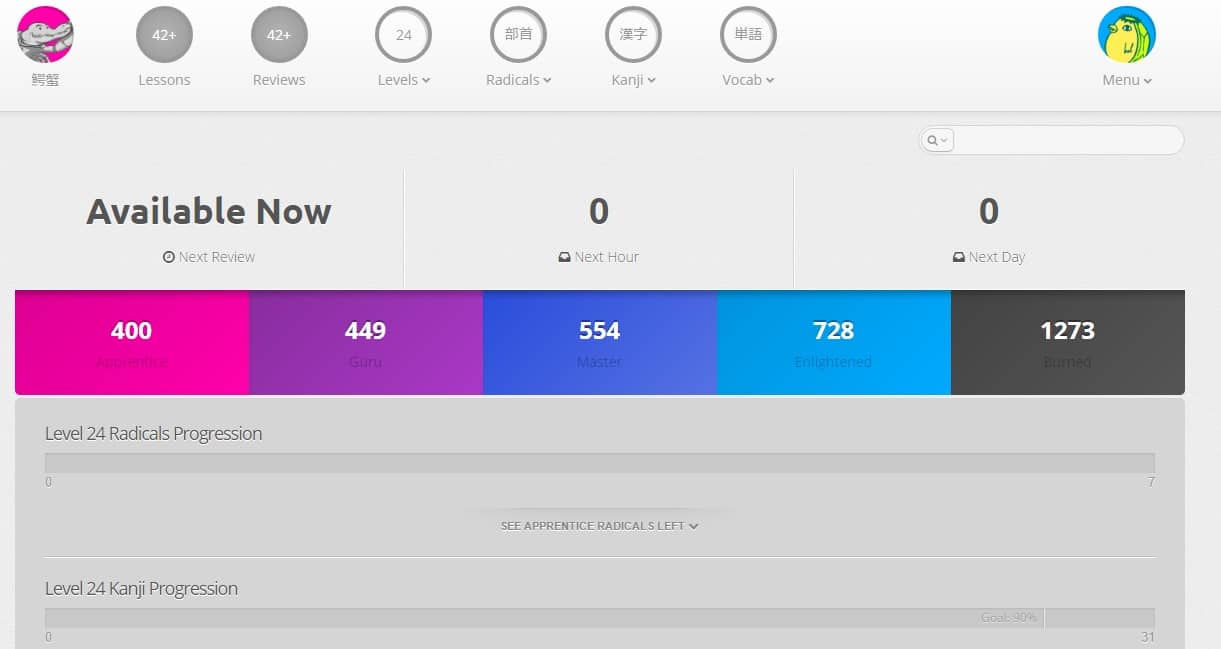I’m going save you the trouble and teach you the most useful word in Japanese, すみません (sumimasen). I very distinctively remember this. When I first came to Japan in January of 2006, I’d been in love with Japan since I was little.
- Watched anime religiously. I was the president of the anime society in uni… yeah, I’ll admit it, I wear my otaku proudly.
- Would randomly try and teach myself Japanese. Unfortunately, the times Japanese was offered at school always interfered with my mandatory engineering classes.
- “Concentrated” in Japan for IB Art in high school.
- I could go on…
That being said, embarrassing to admit, I knew maybe 10 words. You know, the normal: hello, goodbye, thank you (I have some beef with how this is used, that’s for another day), I’m sorry, order a beer, count to 10. Or at least I thought, I knew the word for I’m sorry. Granted, gomennasai、ごめんなさい (interested in an overview of hiragana, one of Japan’s syllabaries? The details are fascinating) does mean “I’m sorry”, you don’t hear it very often in Japan.
Sumimasen, すみません, not only means I’m sorry or please excuse me, where in English we would say “thank you”, in Japanese you say sumimasen. However, it means so much more, and I’d never even heard it (and apparently wasn’t picking up on it by watching all that anime)! Let alone get stuck tongue-twisting it (it took me a second to get
- The 7 Ways of Sumimasen
- 1. Gomennasai vs. Sumimasen, using sumimasen as a sincere apology
- 2. As a quasi-thanks and apology
- 3. Making a request with sumimasen
- 4. Sumi-ing at Restaurants and other “getting attention” uses
- 5. Politely taking your leave
- 6. As affirmation
- 7. Timed in ritual
- The Japanese language is fun!
[Editor’s Note: This post was originally published in August of 2018 and has been updated for freshness, accuracy, and comprehensiveness.]
Disclosure: Kristenabroad.com is a participant in the Amazon Services LLC Associates Program and other affiliate programs. For some links to products or services in this article, I may earn a small commission by you using my link. The price for you is not affected.
The 7 Ways of Sumimasen
While it is normally written as kana alone (すみません), formally it is 済みません. The kanji, 済 can mean “settle (as in debt)”, “relieve of a burden”, “finish”. To be quite literal, the word sumimasen is the polite negative of the verb “sumu” (済む, to be over/to be settled). But it gets more complicated than that.
In the late 1990s, linguist Risako Ide performed a study on the meaning of “sumimasen” to which they titled, “‘Sorry for your kindness’: Japanese interactional ritual in public discourse”. The purpose? To explain the dual function of the word as both an expression of apology but also of thanks. It then delves into how this has become a ritualistic notion in Japanese conversation. The main takeaway is there are SEVEN meanings of the word. Hence making sumimasen a super useful word in Japanese.
- Can be used as a sincere apology (see more in a second why you use this instead of gomennasai)
- As a quasi-thanks and apology
- To make a request
- As a way to get attention
- Said while taking leave
- Used as an affirmative response
- Finally as an exchange of acknowledgment that stems into a very ritualistic aspect of “aisatsu”.
Just to be confusing, you can also say “すいません” or “suimasen”, that or “sumimasen” are valid. As it is just dropping the consonant, it makes it slightly easier to say, it is also a bit less formal to say suimasen vs. sumimasen.

1. Gomennasai vs. Sumimasen, using sumimasen as a sincere apology
Recall back in the days of 10 Japanese words worth of knowledge, I had learned “gomennasai” (ごめんなさい) was how you say “I’m sorry”. Now, if you happen to say “gomennasai” to a complete stranger, it’s fine. You’ll get your point across. “I’m sorry”. Which unlike sumimasen with it’s 7 different uses, gomennasai (and it’s shortened renditions) only has one. It doesn’t have the nuisances available to you, and “gomennasai” has a personal aspect to it. You know this person and you really mean it. Think deep bow means it. I did some great personal injustice to you and acknowledging my mistake.
That said, with friends and close coworkers, I normally drop the ending (as you do with many things in Japanese) and just say “gomen”. Saying “gomen” is much less formal than “gomennesai” but it still has a personal connection aspect to it.
As a casual traveler, I would ere more on using sumimasen as an apology, but where? Think “I bumped into you just now and I’m terribly sorry”. More polite but not “I just hit you with my car”. Nuances with language, so fun. For most cases, you’ll be in the accidental-bump stage and sumimasen is a much more appropriate word in that instance than gomennasai.
More formally, you could say “sumimasen deshita”. In terms of truly sincere apologies, moushiwake arimasen. 申し訳ありません is the most formal, but I digress.
2. As a quasi-thanks and apology
It took me a second to be able to describe this one in English terms. Here you are using it in a very humble sense to show regret for asking something but also thanks for doing it. Say you’re watching a documentary about Japan with your friends but they’d rather be watching anime and you oblige by changing the Roku over to the Crunchyroll app. Your friend would say “sumimasen” in this case cause they know you love that documentary but they are thankful you let them change the course of the evening.
Another instance would be where someone may hold the door for you (elevator or otherwise), it’s more common to hear people say “sumimasen” vs. “arigatou” for “thank you”.
3. Making a request with sumimasen
Say you’re lost looking at a map or trying to find someplace to go, the easiest way to get someone’s attention is to say “sumimasen” and look helpless like you probably are feeling.
You can think of it as “excuse me” as in “excuse me could you please tell me how to get to X because Japanese addresses are super confusing!”. That’s right folks, say bye-bye to street names, we work mostly with blocks in Japan. While there are some, it gets difficult. So if you need to ask for directions whether while walking, driving, or taking the train, you would start off “sumimasen”.
4. Sumi-ing at Restaurants and other “getting attention” uses
Now, the creme de la creme…I have a tendency to make things a verb or randomly add “y”s to things. Sumi-ing is one of those instances. Like with friends, “you sumi-ing or am I?” (notice also, I dropped part of the word, #welcometojapanese101). What am I talking about? Well, in Japan, the staff at restaurants will generally leave you completely alone unless you call them over.
This isn’t America where they’ll be stopping by to check on you. You need something? Ask. And by ask, I mean, don’t feel bad about yelling “sumimasen”. Yes, I said yelling. It can get loud in izakayas, or you could be in a one-man show and they had to run to the back. One problem with this is it gets ingrained in you and I have to stop myself from yelling “sumimasen” in other countries, though it is pretty funny when it slips in America.
Similarly, if you need to get someone’s attention because, say they dropped their wallet on the street (more on my missing wallet story another time), you would yell it in this case too.
5. Politely taking your leave
This one starts to get into “失礼します” (shitsureishimasu, which literally can be “I’m being rude) territory but stick with me. When will you here “shitsurei shimasu”? Often when a waiter comes to take your order at a restaurant or drops off food at your table. It has an “I’m intruding” feel to it. But what else could you use in that situation? Sumimasen.
Another perfect use that fits this aspect? How about when you are trying to end a conversation? This is the word for you. Frankly I wish we had something similar in English.
6. As affirmation
Say you’re waiting to get into a super popular ramen restaurant. It’s finally your turn! The employee comes out and says “sorry to make you wait” (お待たせしました, omataseshimashita!), you could just grunt in acknowledgment – you’re hungry after all for some spicy ramen goodness (maybe, tantanmen is one of my faves at least!). Or more politely, you can say…ding ding ding, sumimasen!
Side note: the apologizing for making you wait as opposed to in America where you are probably more likely to hear something like “thanks for waiting”, goes back to the humble aspect of the Japanese language.
7. Timed in ritual
Aisatsu (挨拶) can basically be compared to what we would consider different types of “greetings” in English. A bit more complicated than that for our current purposes. It’s deeply a ritual aspect of Japan. Think bowing! Which is exactly what this use of sumimasen is. Think of it as a verbal use for the non-verbal bow.
The Japanese language is fun!
There you have it, some helpful tips and a bit of humor for you, I hope. To start, I would concentrate on using sumimasen as an apology, like when you bump into someone while exploring busy areas, like the historic regions of Kanazawa, and definitely try out “sumi-ing” at the local monjayaki restaurants in Tokyo or any restaurant or izakaya, for ordering or asking for the bill. Except perhaps those with a doorbell, like Denny’s.
Like I’ve said before, Japanese is a fun language, case in point by my writing over 1500 words about ONE word. If you want to expand your knowledge of Japanese, definitely check out some of my text reviews.
Do you have a favorite word?



My favorite word in Japanese is sumimasen too:) I studied the language for 2 years in University and am very connected to the culture; think I was Japanese in a past life.
Your travels sound amazing!
I think I was Japanese in a past life too! Love the culture so much. I’m jealous you got to study in University, I tried for YEARS to be able to fit it in but it always was only offered when I had no choice but to take an engineering course.